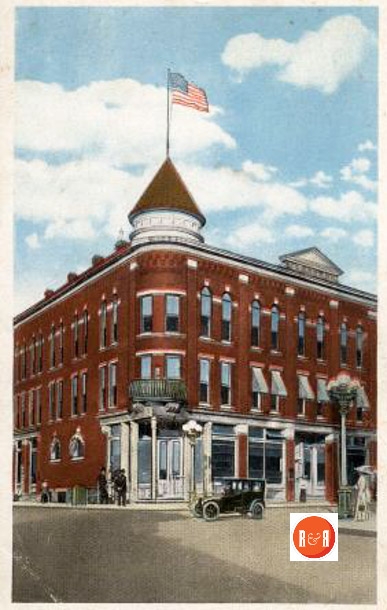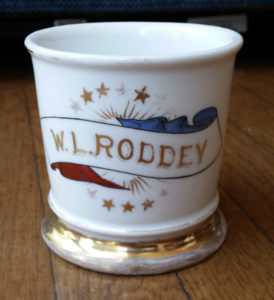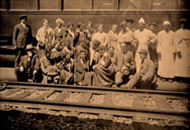The Rock Hill Herald reported on Feb. 14, 1884 – “It was reported that a certain fellow in town became very drunk and tried to eat Henry Toole’s barber pole thinking it was a giant stick of candy.”
The Rock Hill Herald announced on April 7, 1887 – “containing a list of voters to serve of a grand jury, one being Mr. Henry Toole”
City Directories and History: 310 Flint Street in 1908 – J. Henry Toole, 1914 – J.H. Toole, 1922/23 – Ella Toole,
The Rock Hill Herald on May 26, 1881 contained an ad from Henry Toole, barber which stated, “I now have a good barber to assist me in my shop. Anyone calling upon me will now be waited upon well and properly.”
The Herald reported on Sept. 28, 1882 – “Henry Toole the tonsorial artist has moved to the store room lately occupied by W.L. Roddey and Co., this gives him a better location.”
The Rock Hill Herald reported on Sept. 6, 1883 – “The residence of Henry Toole narrowly escaped being destroyed by fire last Tuesday. It is believed the fire was started in a closet but it was caught and extinguished quickly.” (Note R&R does not know his address at that period.)
On Sept. 9, 1886 the RH Herald reported – “Henry Toole complains of the action of the Congressional Convention in prohibiting colored democrats from voting in the primary. Your Editor agrees with Toole.”
The Yorkville Enquirer reported on July 18, 1888 – “Henry Toole has commenced the erection of a two story brick building on Main Street, to be used as a barber shop and billiard room.”
The Herald reported on Jan. 11, 1893 (an ad) – “For rent a store building with a glass front on Main Street adjoining the store of S.T. Fewell and Com., apply to J.H. Toole.”
The YV Enquirer reported on Jan. 11, 1893 – “The wife of Henry Toole, the colored barber of Rock Hill died last Saturday. Her body was taken to Charlotte for burial.”
The Yorkville Enquirer reported on March 15, 1893, “J. Henry Toole, colored, of Rock Hill is a candidate for the office of Register of Deeds for the District of Columbia. Toole is a Democrat, and a color man of great deal more than average intelligence.”
The Herald reported on May 2, 1900 – “Henry Toole has removed his barber shop from the basement to the room first Southeast of the National Union Bank. Payton, the tailor, has apartments in the rear of the barber shop.”
The Herald reported on Jan. 7, 1903 – “S.C. Weston, the tailor, has removed his shop from the Toole Building, to the front room over the old Savings Bank.”
Rock Hill Herald, February 16, 1911: Henry Toole, the well-known and popular colored barber,
has sold his business to Mr. A. K. Collins. Toole has always had the confidence and esteem of
the white people of the city, some of whom he has waited on for 30 years. He has not decided
yet what business he will engage in.
HENRY TOOLE, ROCK HILL’S FIRST BARBER by P.M. Gettys – 2014
Following the ordeal of the Civil War, Rock Hill was struggling to grow and prosper amid the conflict and confusion of Reconstruction. A number of Confederate veterans moved to the village to find new opportunity and to participate in the growing community clustered around the rail depot. These men and their families led to a new period of growth and expansion for the town. In 1870, a young African-American man came to Rock Hill to open the first barber shop. J. Henry Toole was able to appeal to the white men of the town and soon became an established figure on Main Street. His barber shop was a fixture in Rock Hill for over forty years, and Toole became an important property owner and leader in the civic, political, educational, and religious life of Rock Hill during the turbulent years of Reconstruction and the Jim Crow laws. His story is remarkable in many ways, especially in his acceptance by the white establishment during a period of strained race relations.
The Rock Hill Herald reported on Aug. 26, 1896 – “The Herald staff has been regaled every afternoon recently by some very sweet music made by two Italians who are now making our city their home. Their place of practice is in the rear of Henry Toole’s Barber Shop. We hope they will receive much encouragement to induce them to stay in our city.” Sept. 19, “The two Italian musician here this summer have departed.”
Born about 1852 in North Carolina, Henry Toole was about 18 when he arrived in Rock Hill. His family included a brother, Gray Toole, who lived in Washington, D. C. and served as personal barber to President Grover Cleveland. In January 1896, he married Ella Mikell, (The Herald reported on Jan 4, 1896 – That Mr. J. Henry Toole, the well known barber, will be married in Charleston on the 29th of this month. The bride elect, Ella Marion Mikell, is a citizen of that city.) and they had four children. The Tooles lived at 310 Flint Street, just off Saluda Street.
- Shaving mug of Toole’s customer and friends, Mr. W.L. Roddey. Courtesy of the Roddey-Lobato Collection, 2019
Toole’s first barber shop was on the north side of Main Street near the corner with Railroad Avenue (now Dave Lyle Boulevard). Later the shop was located in the Roddey Building and the address was 101 ½ Main Street. Each regular customer had a personalized shaving mug for his shaving brush. Each mug had the customer’s name printed in gold, and they were stored in glass cases on the wall. Many customers came in daily for a shave. In the early days before electricity, there were fans with ropes which connected to a back room, where a boy would sit and pull the rope to rotate the fans. Toole’s customer base evidently grew, and he began to save money for investing in property. By 1913, the family was also running a grocery store on Saluda Street behind the family home.
In 1872, York County was in turmoil over the activities of the Ku Klux Klan. President Ulysses S. Grant declared a number of counties to be in a state of rebellion, instituted a state of martial law, and suspended the writ of habeas corpus. Captain Lewis F. Merrill was sent to Yorkville to try to end KKK activity in the area. Many white men implicated in Klan activity fled the county for Canada or the western states. Within a few days, at least 195 men from York County had been arrested. Among these was Henry Toole, the black barber. Toole shared a cell for 41 days with Captain Iredell Jones of Rock Hill and Samuel A. Fewell of Ebenezer. One source says that Henry Toole plied his barber trade with his white friends while incarcerated. He was eventually released with no formal charges, while three other black men were sent to Columbia for prosecution. We will never know if this black man was actually an active member of the Ku Klux Klan or whether Henry Toole was swept up in the general confusion. While this episode followed him for the rest of his life in the African American community, it helped to cement the loyalty of his white customers and partners. In the hotly contested Governor’s election of 1876, Toole stood with the Democratic Party in its support for the Confederate hero, Gen. Wade Hampton. The Democrats were struggling to overthrow the Reconstruction government of South Carolina, which many considered corrupt, but which had enfranchised blacks for the first time. Hampton was supported by the Red Shirts, a paramilitary organization sometimes accused of racist attacks. When Hampton came to Rock Hill, the great parade included a cavalry unit of black men led by Henry Toole. Hampton’s contested election ended Reconstruction in South Carolina. He attempted to create a middle way, with reestablished control by the white elite but with respect for black participation in the political process. This enlightened approach gradually eroded over the next decade, and repressive laws eventually disenfranchised the black population. Nevertheless, Toole considered himself a life-long Democrat.
Another remarkable activity by Henry Toole began by 1873, when he purchased his first lot on Main Street in Rock Hill at the age of 21. An analysis of York County property records shows that he purchased sixteen properties and participated in twenty-one property sales over a forty-three year period. During this time at the height of official discrimination of the black race by the white power structure, a black man in Rock Hill became the landlord for many white-owned businesses. He bought and sold land and buildings to powerful Rock Hill businessmen, many of whom were Confederate veterans. Newspaper notices during the 1880s and 1890s describe the store buildings erected by Toole, the influential businesses located in his buildings, and his land swaps with white property owners. Like other property owners, he suffered disastrous fires and rebuilt with bigger and better buildings.
Henry Toole was a leader in the religious and cultural life of Rock Hill. In his early years in Rock Hill, he was evidently the only African-American member of the Episcopal Church of Our Saviour. By 1884, he led in the establishment of a black Episcopal church, called St. Paul’s. Led by Rev. Edmond M. Joyner, the church purchased property and built a sanctuary on South Wilson Street near West Black Street with help from both white and black donors. St. Paul’s had a Sunday School, a trade school, and a day school for young children under the leadership of W. L. Mellichamps. Henry Toole was the leading force in St. Paul’s. In 1898, Toole was the leader in the establishment of an African-American newspaper, the Rock Hill Messenger. In 1897, he was the leader in the establishment of an insurance company providing coverage to African-American families. Between 1913 and 1915, he petitioned a number of times for the establishment of a public school for black children, and offered a space in one of his buildings.
Henry Toole had close ties to many important local and state politicians. In 1894, he sought the position of Register of Deeds for Washington, D. C., which would have been a very prestigious and substantial job. When he was not selected, he then sought the position of Recorder of Wills. When this failed as well, he stayed in Rock Hill. The Herald in February 1896 carried an article stating that Toole had arranged a visit to Rock Hill by Thomas E. Miller, a black man who had represented Beaufort County in the legislature. Miller was to speak on the recent Constitutional Convention, which had disenfranchised most black voters. In January 1907, an article in the Herald reported that Toole had paid an unannounced visit to the office of Governor Duncan C. Heyward. The article stated that as soon as the Governor saw him he said, “Why, good morning, Henry, I am glad to see you. Your father in law is the first man who ever cut my hair.” Governor Heyward later made Toole a Notary Public. His political activities resulted in an unwelcome episode in Toole’s life. In 1906, Toole had endorsed a candidate for the Presidency of Clafflin College. The State newspaper in Columbia reported this and included a reference to Toole’s arrest for suspected Klan activity in 1872. This article was picked up in the August 24, 1906 edition of the Rock Hill Messenger, whose editor, C. P. T. White, editorialized, “…We are quite sure we voice the sentiments of every self-respecting colored citizen of South Carolina when we say that the negroes of this state will rise en masse and boycott any institution managed by a member of the race appointed on the recommendation of a ‘Negro Democrat – A Klu Klux…’”
Toole sued the editor of the paper (a paper that he had established) for malicious slander. He was represented by one of Rock Hill’s prominent white law firms, but the unpleasant case was settled out of court.
As Henry Toole’s health began to decline, he sold his barber shop business, still located in the Roddey Building at 101 ½ Main Street, to Albert K. Collins of the Indian Land section of Lancaster County in 1911. He continued to invest in property, buying and selling several lots and buildings during the decade of the nineteen teens. He had several strokes which limited his capacity to continue working, and he died on October 15, 1920. His funeral was held at the Episcopal Church of Our Saviour with a large crowd of both blacks and whites attending. The service was conducted by the Episcopal Rector, Rev. W. E. McCord, assisted by Rev. F. W. Gregg, pastor of the First Presbyterian Church and Rev. Arthur S. Rogers, pastor of the First Associate Reformed Presbyterian Church. Honorary pallbearers were the following white men: Gilbert H. Greene, John T. Roddey, B. M. Fewell, Henry Massey, Capt. J. W. Marshall, John A. Black, Julius Friedheim, W. W. Gill, David Hutchison, William H. Hutchison, and W. J. Rawlinson. These men represented the founding families and leading business families in Rock Hill society. Burial was in Charlotte.
Toole’s widow Ella continued to live at the Flint Street home for a few years. The 1925 City Directory reports her sons Edward N. Toole as married and working as an electrician, Leroy Toole working as a bricklayer and living at 310 Flint Street, and Julius Toole as a porter at the London Printery and also living in the home. Daughter Alice L. Toole was a student and also was living in the home. The November 1926 tornado which passed through downtown Rock Hill damaged the roof of the house of the widow Toole. The children eventually began to move away, and Ella moved to Philadelphia. By the 1933 City Directory, there were no Tooles listed as living in Rock Hill.
If you want to know more about the locations he worked in and in some cases owned, type Toole into the R&R search box in York County, S.C. and read even more about this remarkable gentleman.
Sources of information for this article: Louise Pettus, “J. Henry Toole,” article in Living at Sun City Carolina Lakes, February 2012.
Newspaper articles in the Rock Hill Herald, the Rock Hill Record, and the Rock Hill Messenger.
York County Clerk of Court, property transfer records.
William B. White, Jr., Along the Land’s Ford Road: A History of the Ante-Bellum Village of Rock Hill, South Carolina, 1850-1860, Vol. 1, Historic Rock Hill, 2008.
Douglas Summers Brown, A City Without Cobwebs: a History of Rock Hill, South Carolina, USC Press, 1953.
Lynn Willoughby, The Good Town Does Well: Rock Hill, S. C. 1852-2002, Rock Hill Sesquicentennial Committee, 2002.
Interview, Edward Toole, March 2007.
Stay Connected
Explore history, houses, and stories across S.C. Your membership provides you with updates on regional topics, information on historic research, preservation, and monthly feature articles. But remember R&R wants to hear from you and assist in preserving your own family genealogy and memorabilia.
Visit the Southern Queries – Forum to receive assistance in answering questions, discuss genealogy, and enjoy exploring preservation topics with other members. Also listed are several history and genealogical researchers for hire.
User comments welcome — post at the bottom of this page.
Please enjoy this structure and all those listed in Roots and Recall. But remember each is private property. So view them from a distance or from a public area such as the sidewalk or public road.
Do you have information to share and preserve? Family, school, church, or other older photos and stories are welcome. Send them digitally through the “Share Your Story” link, so they too might be posted on Roots and Recall.
Thanks!
User comments always welcome - please post at the bottom of this page.








J. Henry Toole followed in his brother’s ( Gray Toole) footsteps. They were barbers, Democrats, and firefighters. The men that were arrested with J. Henry Toole for being members of the KKK were members of Rock Hill’s Volunteer Fire Company. J. Henry Toole was negotiating with them to obtain their old hand pump fire engine for the town’s African American Fire Company. The arrest cemented their relationship.